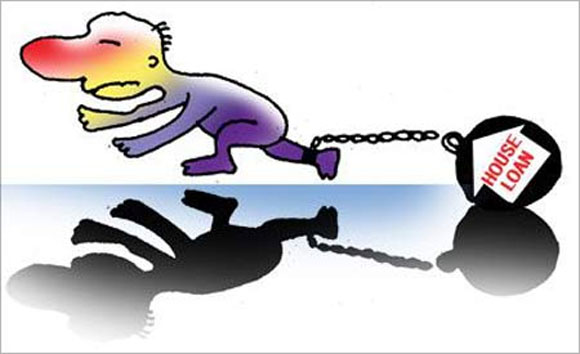 | « Back to article | Print this article |
Women get upper hand in property disputes
A resolution depends on the the kind of property held jointly and the ownership pattern.
As chartered accountant Rana Shukla (name changed) and brother Raju Shukla were jointly running their late father’s business, they acquired many properties together. Now, they are busy running from one law firm to another, evaluating the various options of splitting the business and properties they own jointly.
R N Gupta, managing partner of law firm S N Gupta and Company, is handling a similar case in which the client is paying a substantial amount of money as stamp duty and registration cost. “That’s why we suggest it is always better to avoid owning properties jointly. Splitting it becomes complex,” Gupta says.
And, in case the property owned jointly was bought on a joint loan, the problem is aggravated manifold. Or, if one of the joint owners passes away while holding a property jointly and the legal heirs become involved in the issue, there is little surety on when the matter would be resolved, Gupta cautions.
The issue or a resolution to it depends on many factors, such as the relationship between the joint owners of the property, the kind of property held jointly and the kind of owners who hold the property.
Matrimonial lawyer Mrunalini Deshmukh says the legal course for splitting a property held jointly depends on the share a joint owner has in the property. For instance, does the joint owner hold a stake, that is, did he/she pay a percentage of the cost of acquisition of the property? Or, was the name added merely for convenience. Or, was the property created in the name of the joint owner to be passed on to him/her in the event of death of the other owner?
Click on NEXT for more...
Women get upper hand in property disputes
Say a married couple that owns a property jointly wants to separate. “If the wife had also paid (a percentage of the cost of the house) at the time of buying the property, at the time of splitting she will have to be paid her share if the husband wants to keep the property.
The wife will have to prepare a sale or gift deed in favour of the husband and move out of the ownership of the house. This deed will have to be a registered one, for which the wife will have to pay stamp duty as well,” says Gupta.
Women have an upper hand when a couple split. So, it is likely the wife would secure the ownership of the house. As a result, she might have to pay the husband’s share to him. Lawyers say often, though the wife earns more or is richer than the husband, she may still get an upper hand.
If the joint property was bought on a joint home loan, the party moving out of the ownership would have to secure a no-objection certificate (NOC) from the bank showing he/she is no longer liable for the loan.
Anil Harish, partner of law firm DM Harish and Company, says if A and B jointly own a property on a joint home loan and B decides to move out of the ownership by selling his/her share of the property to A, B would have to contact the bank and inform it of this.
It is likely the bank would ensure the loan repayment wouldn’t be affected by this, that is, A would be able to repay the loan. Only then would it issue an NOC to B.
Click on NEXT for more...
Women get upper hand in property disputes
For joint loans, if an owner stops repaying, the other is asked to repay the share of both parties. This may be through rental income from the property or by selling the property, depending on the severity of the case.
“If the property is held by the husband and the wife’s name is added as a co-owner only for convenience, then, too, the wife has a right over the house — the right of residence in the matrimonial home.
In this case, if the wife has to leave the matrimonial home, the husband would either have to pay rent to her every month for renting another house or pay a lump sum to buy another house. It depends on how they want to split,” says Deshmukh.
In this case, the wife not only has half the right on the matrimonial home, but also a right in the husband’s share of the property. As such, she has more rights over the matrimonial home, say law experts.
Say, a father buys a property in the name of his daughter. In this case, the daughter would retain her right over the property and can claim her stake. The case would be the same if the property was inherited by the father and the daughter had been named in it.
Click on NEXT for more...
Women get upper hand in property disputes
In such circumstances, women get more protection, Deshmukh says. In case of separation due to domestic violence, irrespective of whether a woman has stake or has been named in the property, she has the right of residence in the matrimonial home and the husband would have to pay for it.
Harish says the distribution of the property also depends on the type of property held — residential property where the joint owners are living, jointly held let-out property, jointly held vacant property, commercial property, a plot of land, etc.
“If both parties stay in a residential property, either may sell his/her share to the other and get paid for it. Or, the parties could sell the property to a third party and share the proceeds according to the ownership pattern,” says Harish.
Let-out properties need not be sold. Instead, the rent can be shared according to the ownership of the two parties. If the two parties hold a property that can be divided, such as an office with two rooms, both parties can get a room each. Similarly, a plot of land can be divided between two parties.
Click on NEXT for more...
Women get upper hand in property disputes
Ways to resolve property issues
Types of property
Residential property where joint owners live: One of the owners can sell his share to the other or sell the property and share the proceeds as per ownership
Let-out property: Rent can be shared between the owners
Vacant property: Sell and share the proceeds according to ownership pattern
Plot of land & commercial property: These properties can be divided, like an office with two rooms can be divided into one room per owner, and so can a land parcel be divided
Pattern of joint owner
Jointly bought the property: The owner moving out of the ownership will have to sell the property to the other by way of a registered sale deed
Joint owner’s name added for convenience: Between a husband and wife, the wife has a right over the matrimonial home. If she has to leave the home, the husband will have to pay her monthly rent for another house or a lump sum to buy another house. Even a daughter has rights over a property held with her parent(s)
Asset created in the name of joint owner: Say, a father buys a property in the name of his daughter. In this case, the daughter would retain her right over the property and can claim her stake. The case would be the same if the property was inherited by the father and the daughter had been named in it





